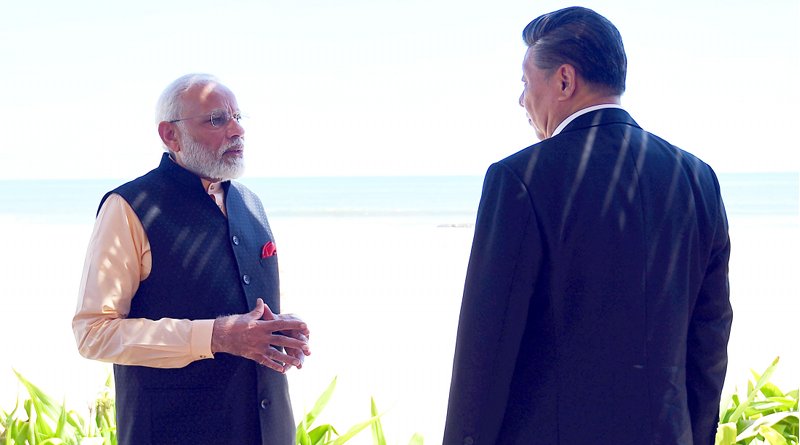Xi Jinping In India: A Diplomatic Opportunity? – Analysis
By Institute of South Asian Studies
By C Raja Mohan
China’s President Xi Jinping might visit New Delhi for the G-20 summit to be held on 9 and 10 September 2023 has triggered political hopes for a breakthrough in Sino-Indian relations. Optimists view Xi’s presence in Delhi – yet to be confirmed by Beijing – as an opportunity to end the negative phase in bilateral relations. Pessimists, however, point to a deepening structural crisis in the Sino-Indian relationship.
India’s China ties have been in deep freeze since Beijing’s transgression of the disputed frontier in Ladakh during the summer of 2020. The violent clashes between the People’s Liberation Army (PLA) and Indian troops at the Galwan River saw the first deaths on the frontier in nearly five decades. Three years later, New Delhi and Beijing are still locked in a continuing stand-off with nearly 50,000 troops deployed on either side of the contested border. Several rounds of talks between military commanders and diplomats over the last three years have not resolved all the issues.
Two sets of recent high-level meetings in the run-up to Xi’s visit have triggered hopes for a return to normalcy in bilateral relations. In mid-July 2023, China’s top diplomat Wang Yi met with India’s Minister for External Affairs Subrahmanyam Jaishankar in Jakarta on the margins of the Association of Southeast Asian Nation meetings. Wang also met India’s National Security Advisor Ajit Doval on the margins of the BRICS (Brazil, Russia, India, China and South Africa) forum in Johannesburg at the end of July 2023.In both meetings with Jaishankar and Doval, Wang reiterated the need to keep the border dispute in its “proper place”, stabilise bilateral relations and advance in other domains. The Indian side, however, underlined the importance of resolving the boundary tensions as the first step towards restoring normal bilateral relations. Jaishankar has emphasised that the “state of the border” reflects the “state of the relationship”. Doval pointed to the “erosion of trust” in bilateral relations after the Chinese aggression in Ladakh in the summer of 2020. Both sides are sticking to their stated positions.
The Modi government, more nationalist than its predecessors, is playing hardball with China and appears willing to risk a prolonged stalemate with Xi. There is nothing to suggest that Modi will yield on the boundary issue to make Xi’s visit to Delhi a major moment in bilateral relations. However, might Xi ‘untie the knot’ China tied in Galwan three summers ago? New Delhi will surely welcome a decision by the PLA to walk back to the positions it held before May 2020. Xi appears to be in no mood to compromise on territorial issues with China’s neighbours, including Japan, the Philippines, Vietnam, Taiwan and India. Therefore, optimism about major concessions from Xi on restoring peace and tranquillity is not backed by evidence.
Optimists also gloss over the deep contradictions hobbling the relationship today. For those who cannot see the structural crisis in bilateral relations, there was a fresh reminder in July 2023 from the ‘stapled visas’ that Beijing issued to Indian athletes from Arunachal Pradesh participating in World University Games in Chengdu, China. Beijing uses stapled visas to assert its territorial claim over Arunachal Pradesh.
Territorial sovereignty is at the heart of multiple disputes between New Delhi and Beijing. The effort to manage these over the last several decades has been undermined by a series of military crises on the disputed frontier in 2013, 2014, 2017 and 2020. Modi’s government has reacted by accelerating the upgradation of its border infrastructure to match the expansive Chinese modernisation of its military and civilian logistics in Tibet and Xinjiang.
New Delhi has also imposed some measures on limiting the economic exposure to Beijing. These include enhanced scrutiny of Chinese investments, keeping Chinese companies like Huawei out of the rollout of 5G technology and opposing China’s Belt and Road Initiative. Besides these national moves, India has stepped up its bilateral military cooperation with the United States (US). It has also revived the Quadrilateral Security Dialogue and actively promoted a new Indo-Pacific agenda in partnership with Washington.
Pessimists, however, might be underestimating the imperative for a rethink in both capitals. For China, which is facing immense challenges from the US in the Pacific, easing tensions with India could have some strategic value. India sees other powers, including the US and Europe, engaging China even as they step up the confrontation. New Delhi would not want to be the only major power without a significant political engagement with China.
Beijing has also been concerned with New Delhi’s decision to constrain the participation of its companies in the Indian economy. Meanwhile, India is finding ways to tweak its rules blocking the participation of Chinese entities in the Indian economy. New Delhi has allowed Apple to bring its supply chain partners in China into the plans to expand iPhone production in India. New Delhi might also allow Tesla to do the same in producing electric cars.
While pessimists dismiss China’s positions on re-engaging India, the seasoned China hands in New Delhi, like former foreign secretary Shyam Saran see straws in the wind that suggest some space for forward-looking dialogue. For India, though, a significant change in the Chinese position on the border will remain a precondition for showing diplomatic flexibility. Even if there is political will on both sides, diplomats only have a few weeks to negotiate the basis for military de-escalation and political re-engagement before Xi arrives in Delhi for the G-20 summit.
About the author: Professor C Raja Mohan is a Visiting Research Professor at the Institute of South Asian Studies (ISAS), an autonomous research institute at the National University of Singapore (NUS). He can be contacted at [email protected]. The author bears full responsibility for the facts cited and opinions expressed in this paper.
Source: This article was published by Institute of South Asian Studies (ISAS)

